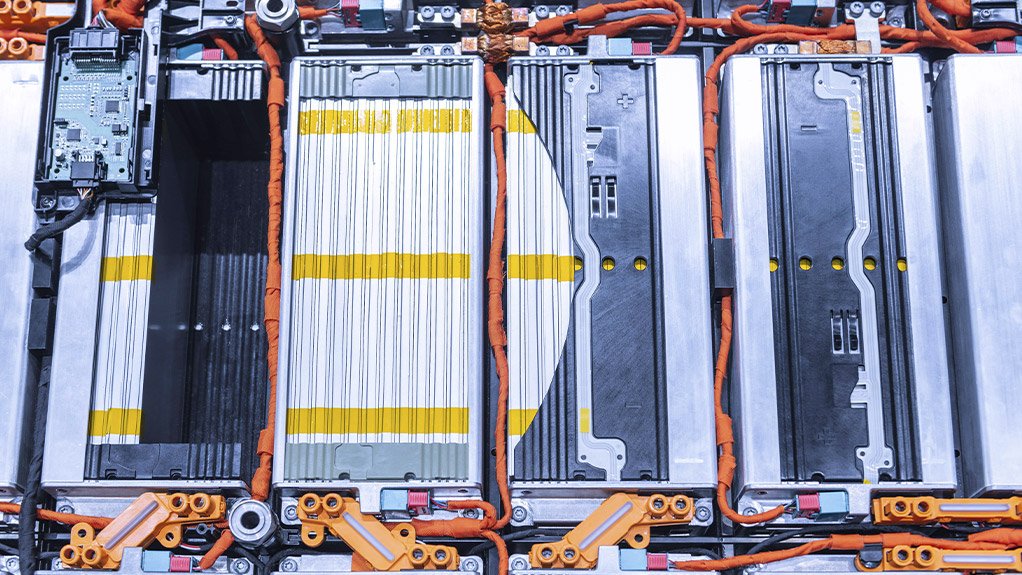Smart manufacturing paves the way for the battery gigafactory of the future
This article has been supplied as a media statement and is not written by Creamer Media. It may be available only for a limited time on this website.
Batteries will have a central place in future energy markets both for mobility and energy storage. According to the International Energy Agency (IEA), global production capacity for electric-vehicle (EV) batteries will need to more than triple from 2020 to 2025 to meet the world’s estimated EV production target.
To deliver the billions of watts of energy that EVs will need in the coming decades will require gigafactories for battery manufacturing. To achieve this, it needs more than simply scaling up traditional production techniques and technologies. It will require new ways of thinking about production processes to maximise speed, flexibility, and throughput. Smart manufacturing is a crucial tool to scaling up battery production. We like to call it the “digital thread” because smart manufacturing does not only effect execution, but also the entire lifecycle optimisation.
It all begins in the early stages of research and development where the chemists and engineers develop new battery concepts. They use the tools offered by computational chemistry and CAD for design, along with PLM to manage product development. The digital thread begins as you start to aggregate information in a virtual environment. Throughout the testing cycle, tools such as MATLAB and Ansys generate even more valuable data.
This data is used to develop “digital twins” of machines that are used later in the manufacturing process, planning and testing operations in the virtual world. These digital twins help to train staff in the virtual world and allow fast ramp-up of production when the time comes. But it does not end there. As the products are manufactured, sold and used, data is collected in the physical world and fed back into the virtual world, enabling both products and processes to be optimised. This merging of the physical and virtual world is the future of battery manufacturing.
Smart production monitoring in battery manufacturing
One of the most important facets of the digital thread is increased visibility through production monitoring. Production monitoring comes from a suite of software called Manufacturing Execution Systems (MES). MES has been utilised with automotive manufacturing for decades, but it will be crucial for battery manufacturers, especially when it comes to customisation. As the market develops there will be a greater demand for customisation even down to unique lots for each car.
With MES software it is possible to integrate control and business systems to execute and track orders across the enterprise. You can also gain the additional context you need to turn production data into actionable information. It is even possible to start small with MES applications that address specific manufacturing challenges. If you need to understand defects, you can use an MES quality application to track, identify and alert when either a machine or operator’s processes go outside of their prescribed limits.
Another application would be in track-and-trace applications to gain complete traceability of batteries through the manufacturing process and help ensure that batteries are safe for use.
Eventually, you can scale up the applications to an enterprise MES software suite that gives you one version of truth across your operations.
Another important example of automated and smart paperless data collection is the Global Battery Alliance's (GBA) Battery Passport. The Battery Passport provides trusted information on indicators related to responsible and sustainable practices. This results in a quality seal, capturing authenticated records of the responsible sourcing, management, recycling and use of a battery across its full lifecycle. The Battery Passport’s role in underpinning a responsible battery value chain has been endorsed during global policy discussions, including in the 2021 G7 Leaders’ Meeting, the draft EU Directive on Batteries and by the Canadian and U.S. administrations. All the data for this must be aggregated automatically.
Better by benchmarking
Together with Samsung SDI, Rockwell Automation has developed an MES system that is paperless and complete with quality loops. Every single production step is documented by the MES. For example, FactoryTalk® Analytics™ could point out that increasing error rates at a station where batteries are bonded directly correlates to the adhesives drum recently integrated into the manufacturing process. According to Samsung SDI, this analysis tool contributes to significant increases in efficiency in the most diverse areas. It not only addresses the obvious, but it also links the correct dependencies for a continuous improvement process, and furthermore, is easy to use. The simple fact that gaining insights that used to take at least an hour can now be achieved within five minutes shows how quickly this solution has amortised itself.
When it comes to the availability of the data outside of the MES, we work with PTC on their IoT platform to increase the visibility of assets. You collect the data and increase the visibility, and from that you can benchmark different machines around the world. If you have ten manufacturing plants it allows you to see which plants, lines, and machines are performing better than others. You will aggregate not only the real-time information from the shop floor, but you will add a lot of other data sources that will enable you to have a 360-degree vision of your operations.
Intelligence conveyance systems
Some may think that smart manufacturing is all about software, but that could not be further from the truth. Hardware will play a crucial role in gigafactories, with high-performance, flexible machines. Equipment such as traditional conveyance systems may only slow you down. These systems use motion-control technologies with hundreds of mechanical details, like rotary-driven chains, belts, and gear boxes. As a result, the systems have limited flexibility as well as operational speeds and acceleration/deceleration speeds that may fall short of your gigafactory’s needs.
A better alternative is a motion-control system with Independent Cart Technology (ICT). Free from the constraints of a traditional conveyance system, this can create faster, more flexible battery lines using independent, programmable movers. It can dramatically reduce changeover times with simple software profiles that allow you to change products at the push of a button. In one case, Eagle Technologies used this technology on a battery pack assembly machine it developed to help maximise EV battery throughput. The machine’s capabilities span from individual cell sorting to full battery module and pack assembly, while also performing required testing. The machine incorporates linear servo motors that position loads in precisely the correct direction at high speeds. And changeovers simply involve selecting the correct mode from the operator interface.
Charging ahead
For the fast-growing EV market to play its part in the decarbonisation of mobility will require highly efficient and flexible gigafactories that can produce EV batteries in high volumes, at high speeds and at a consistently high quality. The end-to-end digital thread will play a crucial role in delivering these data-driven facilities.
Comments
Announcements
What's On
Subscribe to improve your user experience...
Option 1 (equivalent of R125 a month):
Receive a weekly copy of Creamer Media's Engineering News & Mining Weekly magazine
(print copy for those in South Africa and e-magazine for those outside of South Africa)
Receive daily email newsletters
Access to full search results
Access archive of magazine back copies
Access to Projects in Progress
Access to ONE Research Report of your choice in PDF format
Option 2 (equivalent of R375 a month):
All benefits from Option 1
PLUS
Access to Creamer Media's Research Channel Africa for ALL Research Reports, in PDF format, on various industrial and mining sectors
including Electricity; Water; Energy Transition; Hydrogen; Roads, Rail and Ports; Coal; Gold; Platinum; Battery Metals; etc.
Already a subscriber?
Forgotten your password?
Receive weekly copy of Creamer Media's Engineering News & Mining Weekly magazine (print copy for those in South Africa and e-magazine for those outside of South Africa)
➕
Recieve daily email newsletters
➕
Access to full search results
➕
Access archive of magazine back copies
➕
Access to Projects in Progress
➕
Access to ONE Research Report of your choice in PDF format
RESEARCH CHANNEL AFRICA
R4500 (equivalent of R375 a month)
SUBSCRIBEAll benefits from Option 1
➕
Access to Creamer Media's Research Channel Africa for ALL Research Reports on various industrial and mining sectors, in PDF format, including on:
Electricity
➕
Water
➕
Energy Transition
➕
Hydrogen
➕
Roads, Rail and Ports
➕
Coal
➕
Gold
➕
Platinum
➕
Battery Metals
➕
etc.
Receive all benefits from Option 1 or Option 2 delivered to numerous people at your company
➕
Multiple User names and Passwords for simultaneous log-ins
➕
Intranet integration access to all in your organisation





















